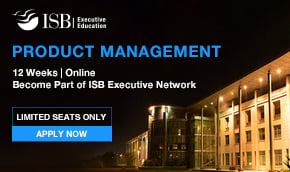How to Become a Product Manager? – An Ultimate Guide

Product Managers (PM) are often referred to as the ‘CEO of Product’ because they are the brain behind a product’s success. However, Martin Eriksson, writer and entrepreneur, believes otherwise. He believes that many product managers do not have direct authority over the majority of functions that lead to a product’s success – from design to marketing, sales to logistics. Therefore, terming them ‘CEO of Product’ is redundant. However, they are an inevitable part of an organisation.
Product managers act as the catalyst between the consumer and the company. They conduct discussions and interviews to gauge the needs and wants of the consumers and incorporate them into the company’s product. They fill the gap between a company’s products and customers’ wants.
Prerequisites required to make a career as a Product Manager
Product manager requirements
These are the three vital prerequisites when diving into a career as a product manager:
- Undergraduate degree in product management or a similar field
- Work experience in product management or a similar field
- Specialised training like a certification or diploma degree
Note: You need a formal education degree or a relevant certificate to get a job in product management. So, after graduation, you can undertake a certification course in product management to prepare yourself for the job. Such certificate courses help you gain hands-on experience and expertise to be industry-ready and add value to a company, besides helping you build skills that can boost your efficiency and productivity at work.
Basic Skills
There are many core competencies every product manager must have. While many are developed during product management courses, others are developed on-job. We have curated a few of them for you:
Technical proficiency
Product Managers need to be aware of all the business functions undertaken while developing a product- from research to marketing. They should know about functions like conducting A/B tests, software development methodologies, product analytics, and others for the smooth functioning of the organisation.
Communication skills
The main role & responsibility of a product manager is to communicate with the customers to gauge their needs and wants. Therefore, every product manager must have excellent communication skills.
Business administration skills
Product managers must know how to lead a team efficiently and effectively. This skill is the baseline for every product manager.
Performing market assessments, conducting customer interviews, and defining success metrics are other basic skills product managers should possess.
Emotional Intelligence
“The capacity to be aware of, control, and express one’s emotions, and to handle interpersonal relationships judiciously and empathetically” is how the Oxford Dictionary defines Emotional Intelligence.
As product managers regularly conduct customer interviews to understand their needs and wants, they need to be empathetic towards their customers to understand their emotions and translate that into the product. Moreover, to draw inferences from their non-verbal expressions like body language, posture, etc. Here are some traits of emotional intelligence that relate to the role of a product manager:
Relationship management
All good product managers form an authentic and trustworthy connection with both internal (employees) and external (customers) sources to inspire and make people reach their full potential. In addition, they motivate and support each other to reach their goal.
Self-awareness
A good product manager should be self-aware of their actions and the implications it causes. A lack of self-awareness can damage relationships and also lead to a lack of confidence. Therefore, self-belief and self-awareness will help you outshine your organisation and motivate others to do so.
Self-management
Becoming a good product manager needs great self-management. As you will always be on a tight schedule, you’ll have to devise self-management strategies to deliver the desired results at the right time.
Finding the right company
You cannot become a good product manager without well-developed skills and high EQ. You need the right company to showcase your skills. So, finding a company that fits your abilities is an important task.
Roles and responsibilities
Here are the roles and responsibilities of a product manager in an organisation:
- Conduct user research and interaction
- Providing support and expertise in market research
- Collaborate with different departments like engineering, sales, and marketing
- Managing, monitoring, and controlling the product lifecycle
- Connecting with the customers to identify insights to make product-related decisions
- Interact with internal product teams to identify new opportunities
Who can Become a Product Manager?
A leader
If you are someone who is self-independent and proficient in performing complex tasks on your own, then the role of a product manager is best suited for you. A product manager is like a Ringleader who conducts interviews and formulates strategies besides performing other tasks to develop a product.
A curious observer
Some people love to keenly observe everything around them. If you are someone who is good at reading semantics, then product manager is an ideal job role for you. You can interact with the customers, keenly observe them, make inferences from the discussions, and implement them into the product design and promotion.
A problem solver
You will become a good product manager if you are a doer, problem-solver, and dreamer because product management is about solving business problems. It is also about understanding the problems customers face and finding solutions to those problems.
Flexible
Product Management is a business function that focuses on the product and its customers throughout a product’s lifecycle. It devises strategies to ensure that the products meet the needs of the customers. Therefore, as the functions, roles and responsibilities of a product manager change rapidly, it is advisable to take up this role only if you are not afraid of the change.
Career-oriented
Product Management professionals get ample of lucrative employment opportunities. So, if you are career-oriented, then the role of a product manager is your best fit. In this domain, there is a wide scope of growth, and there is an ever-increasing demand for product managers.
Job Roles of a Product Manager
Product management professionals are an inevitable part of the organisation. That’s why, they are needed across various levels of the organisation. Here are some popular job roles in the field of product management:
- Product Manager
- Associate Product Manager
- Group Product Manager
- Product Owner
- Director of Product Management
- Vice President of Product Management
- Chief Product Officer
FAQs
What does a product manager do?
A product manager’s day-to-day roles and responsibilities are as follows:
- Analyse customer requirements
- Conducting research on a product, service, competitor, or market
- Strategise a plan for a product or service, i.e., development, packaging, launching, and expanding
- Coordinating and communication about a product or service with management, teams, and stakeholders
- Gathering and analysing feedback about a product or service
- Developing multi-year roadmaps for products and services
- Leading teams throughout the entire product lifecycle
How to become a product manager?
Getting a bachelor’s or master’s degree in product management or a similar field is the first step in making a career in the field. These degrees will help build a strong foundation in product management.
Typically, you will study advertising, marketing, communications, statistics, and promotion.
Here’s a career path hierarchy of a product manager.
- Senior product manager
- Director of product
- VP of product
- Chief product officer
What does it take to become a great product manager?
Many employers look for candidates with advanced degrees in product management or certification courses. Therefore, to become a successful product manager, you will need to pursue a bachelor’s or master’s degree, which will help in building a strong foundation in product management.
What is the salary of a product manager?
On average, product managers earn INR 17,00,000 per annum. The salary for product managers depends on different factors such as work experience, location, company, and others.
What is a product manager?
A product manager oversees all aspects of a product, software, or service, from its design and development to its launch and maintenance. A good product manager understands how to communicate the vision of a product strategy to deliver value to customers.
How hard is it to become a product manager?
Product management is a field that requires aspirants to possess a unique blend of soft and hard skills, making it a difficult task to break into the industry. Additionally, product managers need to be updated with new trends for which aspirants need to have the right level of patience and determination.
Is product management a lucrative career?
Product management is an excellent career alternative for those who want to make something from scratch or love to interact with customers first-hand to understand their wants and needs. You can increase your chances of getting exciting work opportunities by taking an advanced course.
Emeritus India offers various short-term and executive courses in product management. Navigate to the ‘programmes’ section on our website to explore more courses in product management.




